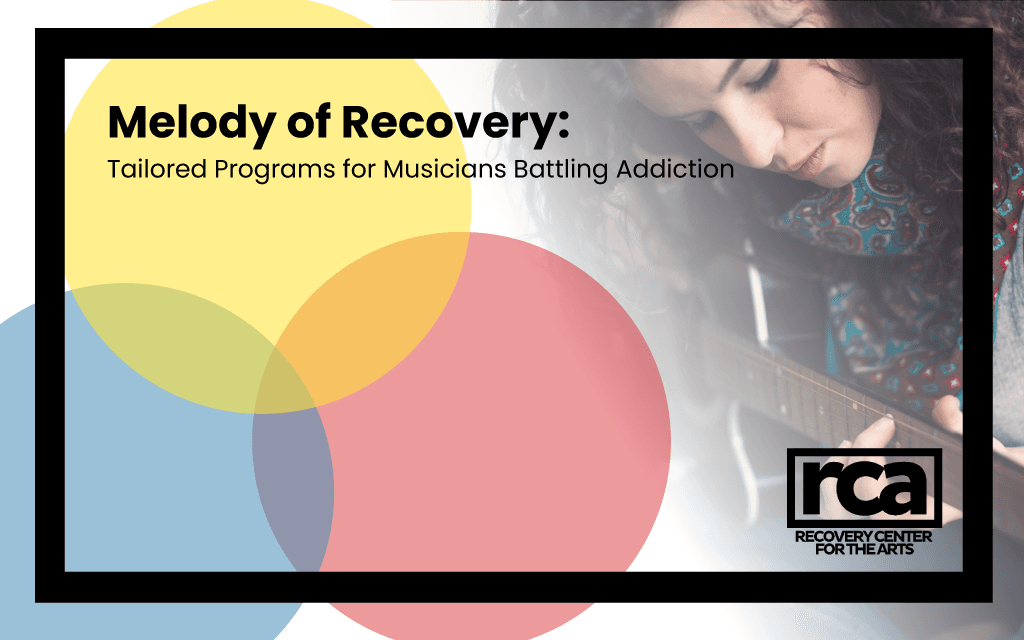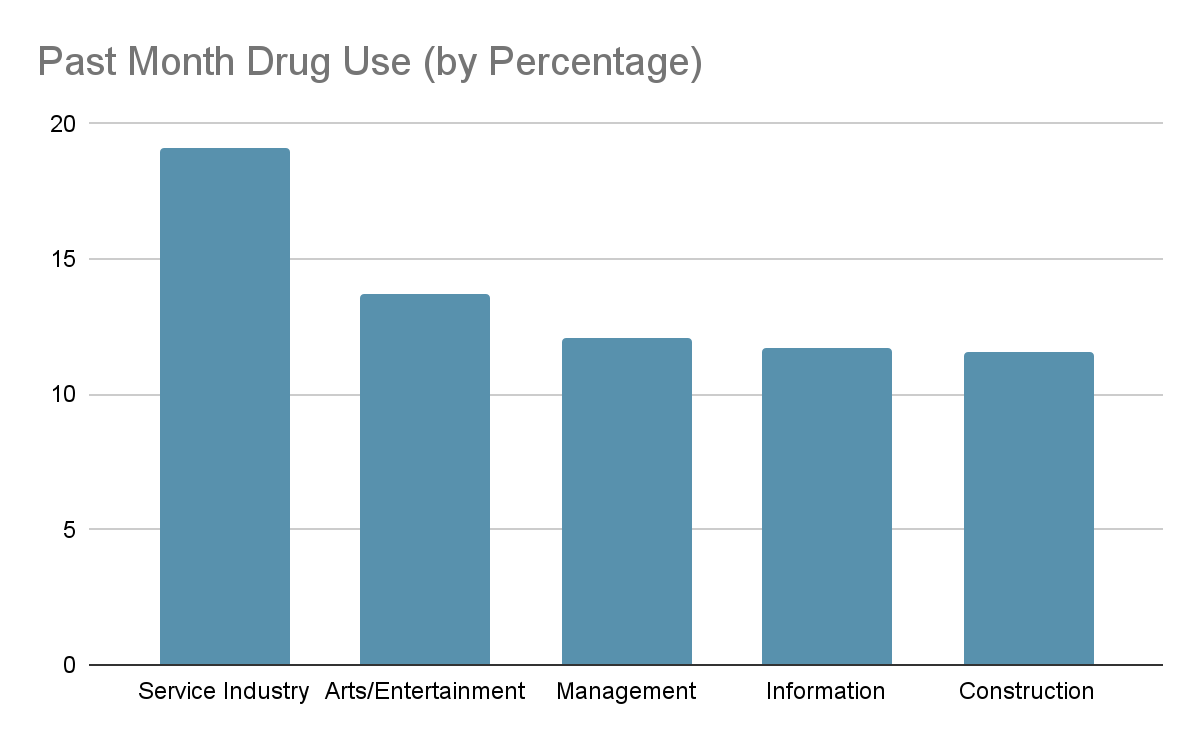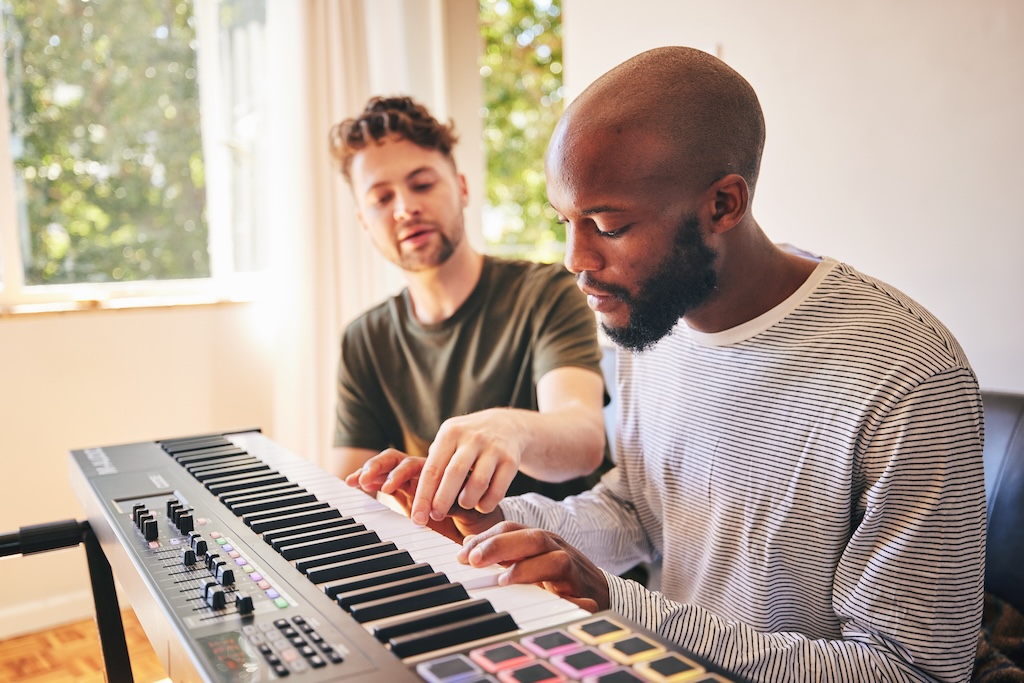
“Calm these hands before they snare another pill and drive another nail down another needy hole please, release me I am surrendering to gravity, and the unknown catch me, heal me, lift me back up to the sun I choose to live, I choose to live.”
Lyrics from “Gravity” by A Perfect Circle
Is creativity a gift or a curse?
How many hours have you spent agonizing over a passion that’s supposed to bring you joy? Do you spend more time worrying about the process of creating than actually creating something? How often do you create because you feel you have to instead of wanting to? And on the days that creativity feels forced, what do you turn to for inspiration?
Drug use isn’t exclusive to the world of music, yet it seems so deeply ingrained into that culture. Is a substance use disorder unavoidable, then, if you want to pursue a career in music? Why are these two so deeply intertwined? Are there even addiction treatment programs for musicians that truly understand what they’re going through?
At Recovery Center for the Arts, our team is dedicated to the creative soul. We’ve seen the unique impact substance use and alcohol have on those who have a passion for creation and music. Our goal is to help our community find healing and happiness while still being able to explore the arts and all they have to offer. Today we’re going to shine a light on the music industry, substance use disorders, and why the two often intersect.
Are Musicians More Likely to Develop a Substance Use Disorder Than Other Professions?
On average, more than 1 in 10 adults in the United States who have a full-time job also have a substance use disorder. Substance use disorders (or SUDs) aren’t picky about what kind of job you have, what your ethnicity is, your mental health history, or anything like that. There is a wide range of people who have a substance use disorder, but are some jobs more likely to have people with SUDs than others?
Studies say yes. The chart below highlights the top 5 industries in which full-time working adults also reported past month illicit drug use.

As you can see, arts and entertainment showed the second highest amount of past month drug use amongst all career types. The same study looked into past month's heavy alcohol use and found arts and entertainment to be the 4th highest industry. Arts and entertainment also ranked 3rd highest for past-year substance use disorders.
Why is that? What is it about the music industry that leads to these results?
What Are the Primary Causes of Drug Use in Musicians?
No matter the profession, there are many common reasons people might engage in substance use. This can range from curiosity to peer pressure, with many things in between.
There are some circumstances, however, that are more specific to musicians or are slightly different for musicians. Let’s take a look at those reasons and why they might influence someone to seek out substance use.
High-Pressure Environments
While there are other professions that often work in high-pressure environments, a musician's experience is different from the pressures of a corporate job. Some of the pressure can stem from similar sources, such as peers and higher-ups, but there’s a lot of external pressure musicians face, as well.
Musicians feel pressure from their managers, family members, record labels, themselves, and their fan base. They may also feel it from society as a whole, depending on their local notoriety. Going viral online, even temporarily, can come with extra eyes and judgment.
This type of additional stress is difficult to manage on your own, especially if you’ve never been taught the tools needed to address your stress healthily. This can lead to people feeling like substance use is an obvious answer to their problems – it’s easy and quick.
The Need to Conform
Over the last century, the music industry has evolved quite a lot. New styles have developed, genres go in and out of popularity, and overall there has been more understanding of how mental health and substance use can impact a person. Despite this, there are many parts of the music scene that are still heavily rooted in drug and party culture.
How many songs can you think of, right now, that talk about partying? How many talk about “we only have tonight” in regards to drinking and doing whatever you want? It could be an entire sub-category of music itself. There are even entire songs dedicated to specific types of drugs. A few examples include “Lucy in the Sky with Diamonds” by the Beatles or “Cocaine” by Eric Clapton.
Nickelback spells it out in their song “Rockstar” which is specifically about the dream of being a famous musician. “The girls come easy, and the drugs come cheap,” is repeated more than once in the lyrics.
Regardless of a person’s original intentions or thoughts on alcohol and substance use, many musicians feel pressure to engage with that lifestyle to fit in. Others may feel like it’s part of the job and that by “making it” they’re simply supposed to behave a certain way.
Burnout and the Fear of Failure
Creative burnout is a very real and common thing that can hit any artist, regardless of their success or skill level. The term burnout, in regards to careers or creativity, refers to a “physical or mental collapse caused by overwork or stress.” In creative fields, this often leads to blank pages and fear. This fear of losing your spark, of not having the same interest in your work as you once did, often leads to desperation.
There are many misconceptions about drug use and creativity. While novels could be written about the human psyche and its alterations under the influence of various substances, including how it specifically impacts creativity, it’s ultimately a temporary fix to a potentially long-term problem. It’s slapping a band-aid over a gaping wound and expecting that this will make it close overnight. It’s treating your mental health as something that can be quick-fixed and expedited, instead of something that requires support and time to heal.
This is why burnout, and by extension the fear of failure, is so often a reason people turn to substances. They think it can solve their problems, or that it was the tool they were missing in the first place when this is not the case.

The Most Common Types of Drugs Used by Musicians
Drug use patterns can change based on your location. For example, methamphetamine is often more readily available and widely distributed in rural and agricultural areas in the United States. If drugs can vary by location, can they also vary by career or socioeconomic status? Are there certain drugs musicians are more likely to turn to than others?
While this list is not exhaustive, some drugs come and go with trends, the section below can give you a good idea of what some of the most common substances are in the music industry.
Stimulants – Cocaine and Meth
Stimulants are a type of substance that leads to high bursts of energy and productivity, at the cost of fatigue, increased anxiety, decreased appetite, and increased depression. Many musicians seek out stimulants, like cocaine and methamphetamines, as a way to “go all night” or to try and force motivation and inspiration.
Opioids – Heroin and Fentanyl
Opioids range from prescription-grade to street-drugs. Anything from fentanyl and morphine to heroin. When taken they bind to dopamine receptors, which is the pleasure center of the body. Opioids also act as a depressant, slowing down your response time and giving an overall feeling of calm. People seek out opioids to relax or feel good, which is often why those dealing with high stress or anxiety might frequently turn to them.
Party Drugs – Ecstacy, LSD, and Poppers
Often also referred to as “club drugs,” this category is very wide in terms of types of substances. Their relation is primarily the scene in which they’re found – parties. Many substances can fall into this category, from psychostimulants like LSD to other hallucinogens and stimulants such as ecstasy or speed. People primarily engage with these substances to “have a good time” while they’re out. It can make their night seem more exciting, or make them feel as though they could “party all night.” These types of drugs can often be associated with peer pressure because they’re “expected” in party environments.
Prescription Drugs – Xanax and Adderall
The prescription medications most often seen in substance use disorders are ones that are approved to treat mental health conditions, such as Xanax for panic disorders, or Adderall for ADHD. The misuse of these substances is even noted in songs like Billie Eilish’s “xanny” where she talks about being surrounded by people who are engaging in this type of substance use.
When these medications are taken without a doctor’s order, the effects can feel similar to those of stimulants or opioids. Some find these medications easier to obtain through friends and other connections. There are also misconceptions that since they can be prescribed by doctors that makes them innately “safer.” This isn’t true when proper health checks aren’t taken, especially if people aren’t getting their pills through medical professionals, as they can never truly know what else might be in them.

Finding a Treatment Program in Arizona That Understands Musicians
No matter what the results or “averages” say, your destiny is not predetermined. All of the above are simply factors that can influence the development of a substance use disorder amongst those on the music career path. You always have the power to take control of your life and change the path that you’re on without sacrificing your creativity and goals.
If you’re a musician who’s read this piece and feels it hits a bit too close to home, rest assured there are addiction treatment services that are dedicated to healing you and your creative spirit. Programs that understand the unique obstacles, stressors, and passions you have. Programs that will work with you without judgment, who want to see you making music once more.
No matter your history with substance use, alcohol, or anything else – there’s no better time to get started than today. Our team here at Recovery Center for the Arts is ready to meet you where you are and build a new foundation of healing together. With a dedicated recording studio that’s integrated into our recovery program, we’ll help you find that creative spark once more. Just give us a call at (480) 386-1593 and we can help you find your future.
Recovery Center for the Arts – Finding recovery through creativity.

